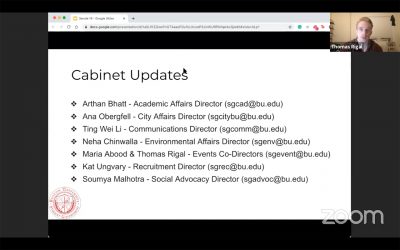
Boston University Student Government received cabinet updates, confirmed a Mental Health Committee co-chair and discussed a potential amendment to the StuGov constitution that would add the definition of a BU college in a Zoom meeting Monday night.
The meeting started with updates to the cabinet. Director of City Affairs Ana Obergfell, a junior in the College of Arts and Sciences, shared plans for an Allston Crawl in the third week of April to support local businesses, as well as a bi-weekly educational voting campaign called Voter Tuesdays.
Communications Director and CAS junior Ting Wei Li said he was gathering information and research for a StuGov Wikipedia page and reported that receptivity to their newsletter improved.
Other updates included the continuation of a compost initiative, plans for an underrepresented students week and StuGov’s potential capacity limits in online event numbers to create a more intimate environment.
The meeting continued with the confirmation of CAS junior Hope Wei as Mental Health Committee co-chair. Wei has been a part of the MHC since her freshman year.
“I’ve grown up in a household where one of my parents suffers from a mental illness,” Wei said. “And I’ve watched them struggle as I’ve grown up.”
Wei said the culture she was raised in did not prioritize mental health, and she witnessed it first-hand within her family.
“I am Chinese, so prior to my parents knowing about my mom’s diagnosis, our family didn’t really understand what mental illness was,” she said, “and I learned that that was because it’s very stigmatized in general, but also very much so in Asian culture.”
She added her experience with mental illness in her family and the way it was addressed and treated inspired her to work toward helping others with their mental well-being.
“I want to be able to educate people … and just give people resources that they need for other people to realize that they’re more than their illness,” Wei said, “that their mental health matters and there’s no shame in getting help.”
As MHC co-chair, Wei said she planned to host game nights on the two University-issued Wellness Days, create an event about xenophobia — specifically on anti-Asian racism that is on the rise — and partner with various organizations for Sexual Assault Awareness Week in April.
Wei was confirmed as MHC co-chair with 38 votes out of 41 senators present.
The next item on the agenda was a proposed amendment to the StuGov constitution clarifying the definition of a college. The amendment was introduced by Kilachand Honors College representatives and CAS seniors Noelle Wojciechowski and Francesca Davy-Falconi.
The amendment would define a college as “any undergraduate unit at Boston University that 1) admits students through a distinct admissions process ; and (2) has its own specified curriculum and program requirements.”
It also introduced the caveat that a member of two colleges on campus could not represent both in StuGov to avoid overrepresentation.
This amendment follows a debate from earlier this academic year about whether KHC should receive Senate seats.
At the time, StuGov’s judicial branch decided that KHC should not gain Senate representation. The amendment proposed would potentially allow KHC to qualify as a college and gain Senate seats.
StuGov President Oliver Pour, a junior in the College of Communication, questioned whether Questrom School of Business Honors or the CAS Core Curriculum could potentially count as colleges under this new definition.
Deputy Justice and CAS senior Christian Vanleer added, in an informal opinion, that other programs outside the intended scope of the amendment could also qualify under this definition.
“I personally believe that programs like Questrom Honors, ROTC would be able to fit in under the language as is,” he said.
At-large Sen. Samatha Casas, a junior in CAS, said she thought the language should be changed to ensure greater specificity.
“I think that this definition doesn’t necessarily work because there’s too many loopholes,” Casas said.
CAS StuGov Executive Vice President and sophomore Evan Teplensky said he was in favor of the Senate meeting again to discuss the matter further.
“This will change how Senate works, and it is not a one-week conversation,” he said. “This needs to be talked about because it is a very in-depth topic.”
Discussion of the amendment was postponed and will continue next week.
Abbigale Shi, editorial page editor of The Daily Free Press, is a Student Government Environmental Affairs cabinet staffer. She was not involved in the editing of this article.
CORRECTION: A previous version of this article stated that the amendment would change the existing definition of a college in the StuGov constitution. There is no current definition of a college in the constitution, and this amendement would create one. The article has been updated to reflect this.























































































































Harold A Maio • Mar 17, 2021 at 5:08 pm
—mental health (meaning mental illness) “is” stigmatized…
By some.
Stating it as a generality is overstating. And very common.
Harold A Maio